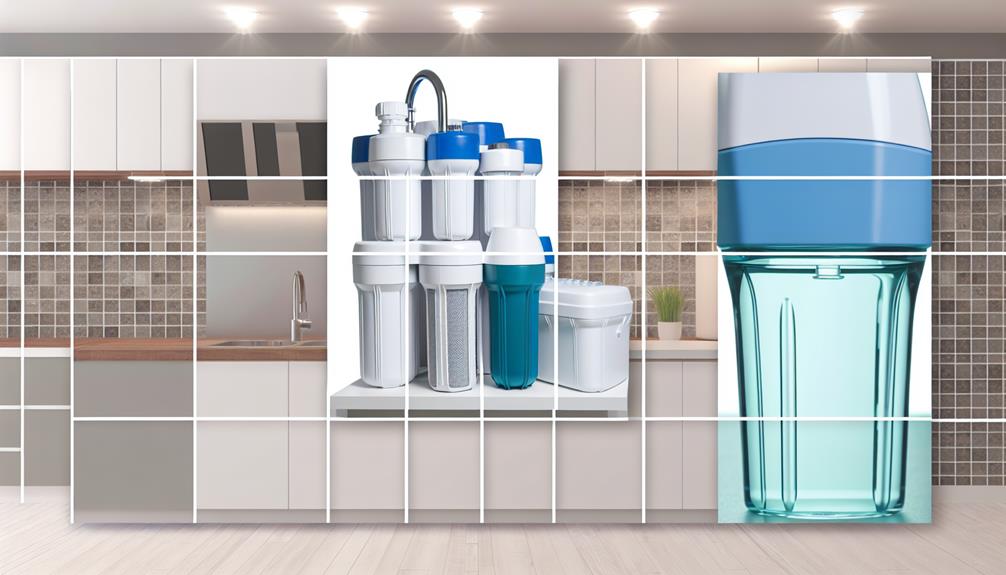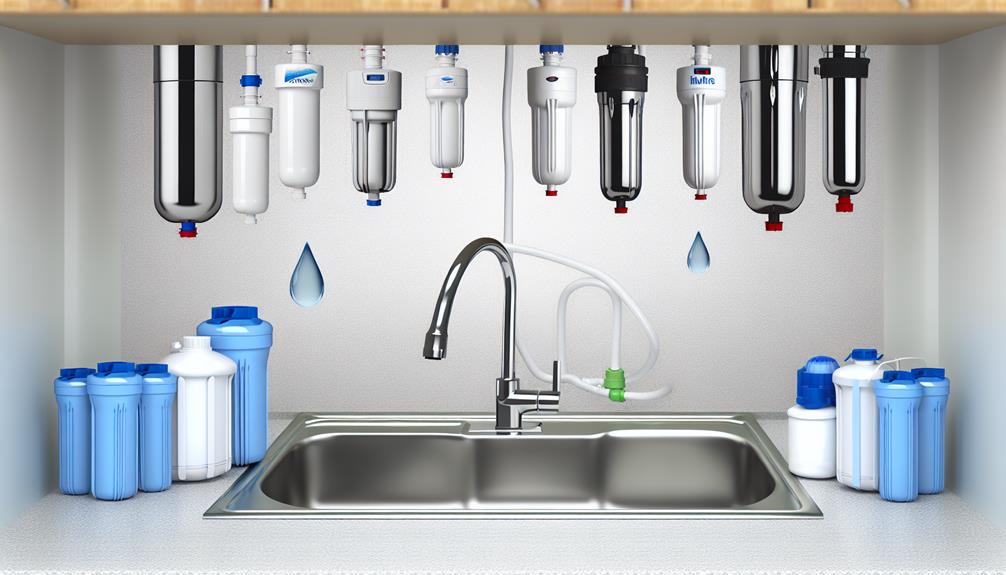Did you know that the average person uses about 300 gallons of water daily, and a significant portion of that is for drinking and cooking? You're likely aware of the importance of water quality, and perhaps you've pondered the environmental impact of how that water is filtered.
The journey of eco-friendly home water filters is a testament to human ingenuity and our commitment to sustainability. Starting with rudimentary methods that date back centuries, the evolution has been marked by a series of innovations, each leapfrogging the last in efficiency and environmental friendliness.
As we stand at the brink of new advancements, you might wonder what cutting-edge solutions are on the horizon, promising to further revolutionize how you ensure the purity of your water with minimal ecological footprint. Let's explore how these systems have become a cornerstone of conscious living, and consider what the next generation of water filters holds for you and the planet.
Early Filtration Methods
Tracing the origins of home water filtration, you'll find that the 'Hippocratic sleeve' designed by Hippocrates in 500 BC marked the inception of a practice that has evolved considerably over the millennia. This early filtration method, a simple cloth bag, was employed by the ancient Greeks to trap sediments that caused water turbidity. Hippocrates, recognizing the importance of clean water for healing, sought to improve the quality of water using this rudimentary purification method.
As you delve deeper into the history of water filtration, you'll encounter the innovation of ceramic water filters by John Doulton and his son Henry in 1827. Their design, a porous ceramic bowl atop another, utilized gravity to filter impurities. This invention laid the groundwork for the first municipal water treatment, which would later employ slow sand filters, a more advanced iteration of sand filtration.
Advancements in Carbon Technology
Building upon the foundational methods of early water purification, recent advancements in carbon technology have substantially enhanced the efficiency and effectiveness of home water filtration systems. You now benefit from a filtration process that utilizes activated carbon filters, which have evolved to be more adept at removing a broader spectrum of contaminants from your drinking water.
- Carbon block filters: Offering greater contaminant removal and a longer lifespan, they're a compact and highly effective evolution in carbon technology.
- Enhanced adsorption capacities: Modern activated carbon filters have an increased ability to attract and hold chemical impurities, leading to cleaner and safer water.
- Eco-friendly materials: These advancements have reduced the carbon footprint of producing and disposing of water filter systems, contributing to a more sustainable environment.
These improvements not only ensure that water filters work more efficiently but also align with the holistic goal of minimizing environmental impact.
While reverse osmosis systems are revered for their thoroughness, the integration of advanced carbon filters has made them even more robust in purifying water. The synergy between carbon technology and reverse osmosis filters means you're equipped with a water filtration system that's both powerful and responsible.
Rise of Ceramic Filters
As consumers increasingly seek out sustainable living solutions, the resurgence of ceramic water filters offers an eco-friendly alternative to modern water purification methods. The roots of using ceramics to remove impurities stretch back to a famous Greek—the Hippocratic sleeve suggested similar principles. Today's ceramic filters, a brainchild of the Doultons from the 19th century, have evolved into sophisticated domestic water filters, merging ancient wisdom with contemporary demands for sustainable water solutions.
These filters capitalize on natural filtration technology, leveraging the porous nature of ceramic to sift out bacteria and sediments. Unlike water treatment facilities that often rely on extensive chemical processes, ceramic filters provide water filtration systems that are environmentally friendly and devoid of complex mechanics.
Your engagement with ceramic filters signifies a holistic approach to water purity. They're not just tools to enhance personal health but also stewardship towards a greener planet. As filtration methods go, they stand out for their sustainability. They're crafted from earthy materials and designed to reduce waste, all while offering a point-of-use and portable solution adaptable to various settings.
Moreover, the longevity and cost-effectiveness of ceramic filters can't be overstated. They're a testament to the philosophy that environmentally friendly and economical can coexist, making them a wise choice for the eco-conscious you.
Modern Membrane Innovations
Modern Membrane Innovations have revolutionized home water filtration, with reverse osmosis systems at the forefront, ensuring your drinking water is free from harmful contaminants like heavy metals and bacteria. These modern membrane innovations mean that the filtration systems are designed to be more efficient and reliable than ever before. They're not only adept at providing clean drinking water but also contribute to the overall improvement of water quality.
By employing a combination of different treatment methods, today's water filter systems are tailored to meet diverse needs, from removing minute contaminants to improving taste and odor. Here's how they're making an impact:
- Reverse Osmosis: Utilizes a semi-permeable membrane to remove impurities, including heavy metals, and ensures safe drinking water.
- Ultrafiltration: Employs hydrostatic pressure to filter out silt, bacteria, and viruses for cleaner filtered water.
- UV Purification: Offers a chemical-free approach by using ultraviolet light to neutralize microorganisms.
Analyzing the holistic approach to water filtration, it's clear that these advancements are pivotal in achieving a sustainable and effective means of accessing clean and safe drinking water.
As you explore your options, consider how these innovative solutions can fit into your home and lifestyle.
Future of Water Purification
While contemporary membrane technologies have set the stage for powerful water purification, emerging methods are poised to redefine sustainability in home filtration systems. As you consider the future landscape of water filters, you'll find that advanced techniques like ultrafiltration and ceramic filtration are at the forefront. These innovations promise to eliminate impurities more effectively and reduce waste, reshaping the efficiency of home water filtration.
UV purification methods are also on the rise, offering a clean and eco-friendly way to purify water. They're expected to become a mainstay in United States households due to their ability to inactivate microorganisms without a negative environmental impact.
Meanwhile, activated carbon filters made from renewable materials are set to replace conventional plastics, marking a significant stride towards greener filtration systems. The shift towards charcoal filtration, derived from sustainably sourced wood, illustrates a holistic approach to water purification. After you've used these filters, they can be repurposed, thus extending their lifecycle and mitigating waste.
This is crucial as the urgency to reduce plastic waste intensifies, positioning water filtration systems as an indispensable tool in promoting environmental stewardship. Your choice in a water filtration system now has the potential to not only provide clean water but also to support a sustainable future.

